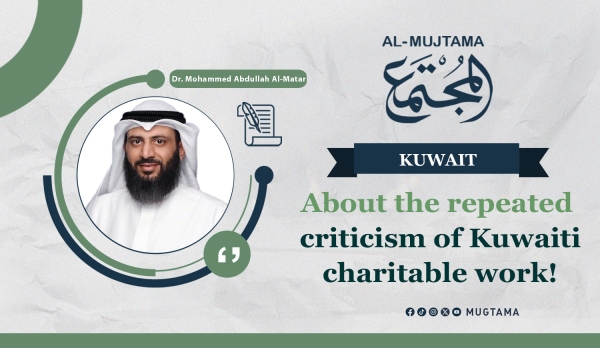Persistent Criticism of Kuwaiti Charitable Efforts!! Featured
Unfortunately, nations always strive to pride themselves on their achievements and distinguishing features, and one of Kuwait's most notable traits is its reputation as a country of charitable work, earning the nickname "The Country of Humanity."
An example of this is the award received by the late Emir of Kuwait, Sheikh Sabah Al-Ahmad Al-Sabah, in 2014 from the United Nations. This unique distinction should be strengthened and celebrated. However, some repeatedly criticize charitable work for political reasons, personal disputes, or psychological motives, failing to recognize that tarnishing this work undermines an ethical value, a soft power, and a distinguishing hallmark of Kuwait.
Read also: Kuwaiti “Humanitarian Photography Grant” Showcases Gaza Suffering to the World
It is worth mentioning that Kuwaiti charitable committees and organizations have a long history in humanitarian work and are subject to strict local regulatory measures to ensure transparency, prevent misuse, and enhance the efficiency of aid distribution. These measures include:
- Government Supervision by the Ministry of Social Affairs:
- The Ministry supervises charitable committees and organizations, ensuring their registration, monitoring their activities, and confirming adherence to laws.
- Law No. 24 of 1962 regarding clubs and public associations serves as the legal foundation for organizing associations, including charitable ones. It mandates obtaining official ministry licenses for activities.
- Law Regulating Charitable Work:
- Law No. 1 of 2016 on nonprofit organizations provides a modern framework for organizing charitable work. It specifies conditions for establishing associations, including presenting objectives, work plans, and funding sources.
- Executive regulations, such as Resolutions 48 and 49 of 2014, govern fundraising activities to ensure lawful purposes.
- Fundraising Regulation:
- Fundraising without prior authorization from the Ministry is prohibited. Permits specify the campaign's purpose, beneficiary, and duration.
- Associations are required to submit periodic financial reports detailing sources and expenditures, audited by the Ministry.
- Financial Oversight and Transparency:
- The Anti-Corruption Authority (Nazaha) and the Ministry of Finance, in collaboration with the Ministry of Social Affairs, oversee financial aspects to prevent money laundering or funding illegal activities.
- Associations must maintain accurate, transparent records and may face surprise inspections if necessary.
- Penalties for Violations:
- In case of violations (e.g., unauthorized fundraising or misuse of funds), penalties can range from warnings and activity suspension to dissolution by court order.
- Security Screening:
- Since 2019, security checks have been conducted for workers in charitable associations, especially expatriates, to ensure no criminal records, in coordination with the Ministry of Interior.
- Digital Transformation:
- Initiatives like the "Sahl" government app simplify procedures, enabling electronic licensing and fundraising permits, enhancing transparency and reducing bureaucracy.
- International Cooperation:
- Kuwait aligns with international standards to combat terrorism financing and money laundering (e.g., FATF recommendations), adding oversight on transferring charitable funds abroad.
Practical Examples:
- In July 2019, former Minister of Social Affairs Maryam Al-Aqeel urged the National Assembly to expedite discussing a new law on charitable work (Decree 43 of 2018) to enhance oversight and performance.
- In March 2025, the current Minister Dr. Amthal Al-Huwaila emphasized the Ministry’s commitment to continuous monitoring of the charitable sector to preserve Kuwait’s humanitarian status.
Read also: Kuwait in a Week
Several organizations have received local and international awards and recognition for their outstanding efforts, such as:
- The Rahma International Society awarded ISO 9001:2015 for transparency and quality standards, and Khalid Al-Issa Al-Saleh Award in 2024.
- Collaboration between the International Islamic Charitable Organization and UNICEF.
- Al-Najat Charitable Society, recipient of the Sharjah Award for Voluntary Work in 2017, among other accolades.
Therefore, while charitable work and its success are commendable, it is unreasonable to consider it flawless. Mistakes and violations may occur as humans are behind these efforts. The key lies in resolving errors and addressing violations without undermining the entirety of the work or casting doubt for incidental or intertwined reasons.


